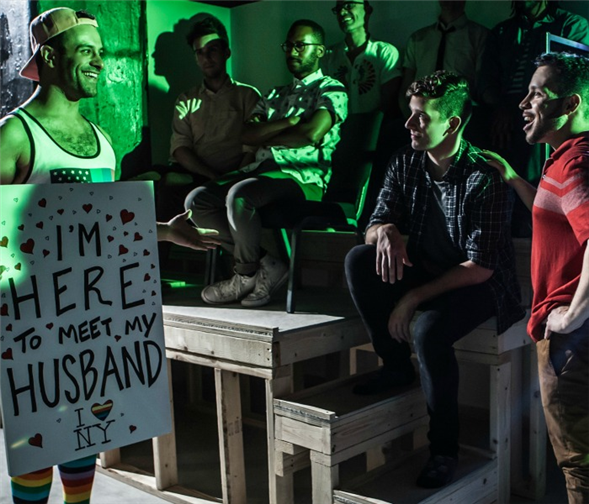Translate Page

A new play takes on social media's role in modern gay America
---
Watching Homos, or Everyone in America, you might find yourself reeling from the whiplash of time travel.
The play, which runs until November 27th at Labyrinth Theater Company’s Bank Street Theater, takes place between 2006 and 2011, and its many scenes unfold out of chronological order.
As you’re flung forward and backward in time, and then forward and backward again, you may want something to help you keep your footing, some kind of detail that will identify when each scene takes place.
And of all things, that detail may be the use of social media. As playwright Jordan Seavey notes, the references to social media tools serve as "time markers" throughout the show.
For instance, when the gay couple at the center of the story -- known only as The Academic and The Writer -- arrange their first date, they use Friendster. (Anyone under the age of 30 may need to ask a wise elder about that one.) Later, one of the men makes contact with a future paramour on MySpace. Both references give an idea of what year their respective scenes are taking place.
These allusions also underscore The Academic’s field of Media Studies. His primary focus is the internet’s potential to effect social change.
This is where the character and Seavey converge. After all, Seavey uses social media not only to ground his audience in time, but also to call attention to how dating apps, online forums, and the like have allowed for greater visibility -- and acceptance -- of gay people.
In one scene, for instance, The Writer celebrates a viral video of a high-schooler coming out at graduation.
Seavey saw a similar video in real life and had conflicting responses. On one hand, he found the declaration "shockingly public." On the other, he admired the teenager’s bravery and applauded the social progress that’s occurred in recent years.
"It's a far cry from Oscar Wilde being imprisoned for indecent acts when a 16-year-old is standing in front of an auditorium and a bunch of cameras, saying, 'I'm a proud gay man,'" the playwright says.
Yet the internet -- and social media's ability to spread information like a virus -- sometimes makes gay people visible in a far more damaging way, Seavey adds, referring to a character who falls victim to a hate crime. After the incident, strangers who have read the grisly accounts online recognize him and recoil.
Seavey is quite intentional about including these negative events alongside the positive. As a dramatist, he aims to write plays that confront audiences with the complexities of gay life and same-sex relationships.
As he says, "I don’t think people have to sit together in a small room very often for an hour and 45 minutes and observe a romantic relationship between two men from such a close standpoint, which this play forces the audience to do."
---
Gavin Whitehead is a writer and dramaturg based in New Haven.
Photo by Monique Carboni: A scene from Homos, or Everyone in America
TDF Members: Go here to browse our current discounts for theatre, dance, and concerts.